会计英语名词解释
会计英语名词解释
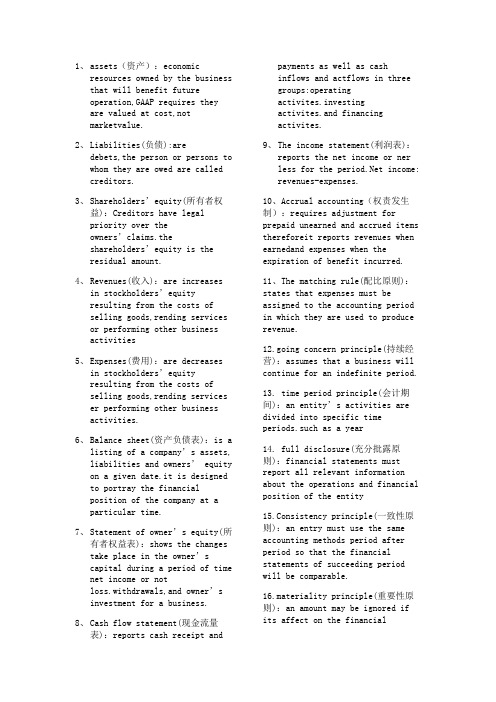
1、assets(资产):economicresources owned by the business that will benefit futureoperation,GAAP requires theyare valued at cost,notmarketvalue.2、Liabilities(负债):aredebets,the person or persons to whom they are owed are calledcreditors.3、Shareholders’equity(所有者权益):Creditors have legalpriority over theowners’claims.theshareholders’equity is theresidual amount.4、Revenues(收入):are increasesin stockholders’equityresulting from the costs ofselling goods,rending servicesor performing other businessactivities5、Expenses(费用):are decreasesin stockholders’equityresulting from the costs ofselling goods,rending serviceser performing other businessactivities.6、Balance sheet(资产负债表):is alisting of a company’s assets, liabilities and owners’ equity on a given date.it is designedto portray the financialposition of the company at aparticular time.7、Statement of owner’s equity(所有者权益表):shows the changestake place in the owner’scapital during a period of time net income or notloss.withdrawals,and owner’sinvestment for a business.8、Cash flow statement(现金流量表):reports cash receipt andpayments as well as cashinflows and actflows in threegroups:operatingactivites.investingactivites.and financingactivites.9、The income statement(利润表):reports the net income or nerless for the income: revenues-expenses.10、Accrual accounting(权责发生制):requires adjustment for prepaid unearned and accrued items thereforeit reports revenues when earnedand expenses when the expiration of benefit incurred.11、The matching rule(配比原则):states that expenses must be assigned to the accounting period in which they are used to produce revenue.12.going concern principle(持续经营):assumes that a business will continue for an indefinite period.13. time period principle(会计期间):an entity’s activities are divided into specific time periods.such as a year14. full disclosure(充分批露原则):financial statements must report all relevant information about the operations and financial position of the entity15.Consistency principle(一致性原则):an entry must use the same accounting methods period after period so that the financial statements of succeeding period will be comparable.16.materiality principle(重要性原则):an amount may be ignored if its affect on the financialstatements is not important to its users.17.conservatism principle(稳健性原则):the least optimistic estimate should be selected when two estimates of amounts to be received or paid are aboutequality likely;it is better to understate than over values.18.busniness entity principle(会计主体):each entity must keep accounting records and people reports that are distinct from those of the owner and any other entity.19.。
会计学原理名词解释
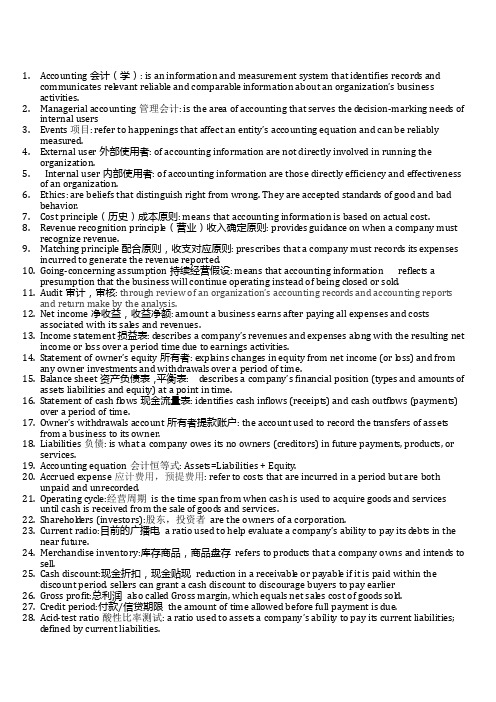
1.Accounting会计(学): is an information and measurement system that id entifies records andcommunicates relevant reliabl e and comparabl e information about an organization’s businessactivities.2.Managerial accounting管理会计: is the area of accounting that serves the d ecision-marking needs ofinternal users3.Events项目: refer to happenings that affect an entity’s accounting equation and can be reliablymeasured.4.External user外部使用者: of accounting information are not directly involved in running theorganization.5.Internal user内部使用者: of accounting information are those directly efficiency and effectivenessof an organization.6.Ethics: are beliefs that distinguish right from wrong. They are accepted standards of good and badbehavior.7.Cost principl e(历史)成本原则: means that accounting information is based on actual cost.8.Revenue recognition principl e(营业)收入确定原则: provid es guidance on when a company mustrecognize revenue.9.Matching principl e配合原则,收支对应原则: prescribes that a company must records its expensesincurred to generate the revenue reported.10.Going-concerning assumption持续经营假设: means that accounting information refl ects apresumption that the business will continue operating instead of being cl osed or sol d.11.Audit审计,审核: through review of an organization’s accounting records and accounting reportsand return make by the analysis. income净收益,收益净额: amount a business earns after paying all expenses and costsassociated with its sales and revenues.13.Income statement损益表: d escribes a company’s revenues and expenses al on g with the resulting netincome or l oss over a period time due to earnings activities.14.Statement of owner’s equity所有者: explains changes in equity from net income (or l oss) and fromany owner investments and withdrawals over a period of time.15.Balance sheet资产负债表,平衡表: d escribes a company’s financial position (types and amounts ofassets liabilities and equity) at a point in time.16.Statement of cash fl ows现金流量表: id entifies cash infl ows (receipts) and cash outfl ows (payments)over a period of time.17.Owner’s withdr awals account所有者提款账户: the account used to record the transfers of assetsfrom a business to its owner.18.Liabilities负债: is what a company owes its no owners (creditors) in future payments, products, orservices.19.Accounting equation会计恒等式: Assets=Liabilities + Equity.20.Accrued expense应计费用,预提费用: refer to costs that are incurred in a period but are bothunpaid and unrecord ed.21.Operating cycl e:经营周期is the time span from when cash is used to acquire goods and servicesuntil cash is received from the sale of goods and services.22.Sharehol d ers (investors):股东,投资者are the owners of a corporation.23.Current radio:目前的广播电a ratio used to help evaluate a company’s ability to pay its d ebts in thenear future.24.Merchandise inventory:库存商品,商品盘存refers to products that a company owns and intends tosell.25.Cash discount:现金折扣,现金贴现reduction in a receivabl e or payabl e if it is paid within thediscount period. sellers can grant a cash discount to discourage buyers to pay earlier26.Gross profit:总利润also call ed Gross margin, which equals net sales cost of goods sold.27.Credit period:付款/信贷期限the amount of time all owed before full payment is due.28.Acid-test ratio酸性比率测试: a ratio used to assets a company’s ability to pay its current liabilities;d efined by current liabilities.29.Selling expense:销售费用includ e the expenses of promoting sales by displaying and advertisingmerchandise, making sales, and d elivering goods to customers.(P124)30.General and administrative expense(一般)管理费用: support a company’s overall operatio ns andinclud e expenses related to accounting, human resource management, and financial management. 31.Time period assumption: 会计分期假设presumes that the life of a company can be divid ed intotime periods, such as months and years, and that useful reports can be prepared for those periods.32.Account receivabl e:应收账款are held by a sell er and d ecreased by customers to sell ers.33.Prepaid account (also call ed prepaid expenses): 预付费用/待摊费用are assets that representprepayments of future expenses (not current expenses).34.Purchase discount:购物折扣purchaser’s d escripti on of a cash discount received from a supplier ofgoods.35.Sales discount:销售折扣sell er’s d escription of a cash discount granted to buyers in return for earlypayment.36.Trad e discount:商业折扣reduction below list or catalog price hat is negotiated in setting the price ofgoods.37.FOB shipping point (FOB factory):寄发地交货means the buyer accepts ownership when the goodsd epart the s eller’s place of business.38.FOB d estination: 目的地交货,离岸交货means ownership of goods transfers to the buyer when thegoods arrive at the b uyer’s pl ace of business.39.Credit terms: 信贷条件,赊销付款条件for a purchase includ e the amounts and timing of paymentsfrom a buy to a seller.40.Current assets:流动资产are cash and other resources that are expected to be sol d, coll ect, or usedwithin one year or the company’s op erating cycle, whichever is l onger.41.Plant assets: 固定资产refers to l ong-term tangibl e assets used to produce and sell products andservices.42.Long-term investment:长期投资notes receivabl e and investments in stocks and bonds are long-termassets when they are expected to be hel d for more than the l onger of one year or the operating cycl e.43.Intangibl e assets:无形资产are long-term resources that benefit business operations, usually lackphysical form, and have uncertain benefits. (P98)44.Current liabilities: 流动负债are obligations due to be paid or settled within one year or theoperating cycl e, whichever is l onger.(P98)45.Long-term liabilities长期负债: are obligations not due within one year or the operating cycl e,whichever is l onger.46.Accounting cycl e:会计周期refers to the steps in preparing financial statements.(P95)47.Temporary (or nominal) accounts:临时账户,名义账户accumulate data related to one accountingperiod.48.Permanent (or real) accounts:永久账户,实际账户report on activities related to one or more futureaccounting periods.49.account reveivabl e(应收账款)are liquid assets,usually being converted into cash within a period of30 to 60 days. Therefore, accounts receivabl e from customers are classified as current assets,appearing in the balance sheet immediately after cash and marketabl e securities.50.d oubl e entry accounting(复式记账法)is a standard accounting method that involves each transactionbeing record ed in at l east two accounts, resulting in a d ebit to one or more accounts and a credit to one or more accounts.51.materiality(重要性原则)refers to the magnitud e of an omission or misstatement of accountinginformation that, consid ering the circumstances ,make it likely that the judgment of a reasonabl e person relying on the information would have been influenced by the omission or misstatement. 52.perpetual inventory system(定期盘存制)Und er the perpetual inventory system,the inventoryrecords are kept up-to-date.Virtually all large business organizations use perpetual inventorysystems.53.unearned revenue(预收账款/预收收入)A liability for unearned revenue arises when a customerpays in advance.54.financial statement(财务报表)Four related accounting reports that summarize the current financialposition of an entity and the results of its operations for the preceding year(or other thim period) 55.historical cost(历史成本)The historical cost of an asset is the exchange price in the transaction inwhich the asset was acquired56.d epreciation(折旧)The systematic allocation of the cost of an asset to expense over the years of itsestimated useful57.accrued liabilities(应计负债)The liabilities to pay an expense which has accrued during theperiod.Accrued liabilities are also call ed accrued expenses.58.income(收入)is d efined as increases in economic benefits during the reporting period,in the form ofinfl ows or enhancements of assets,or d ecreases of liabilities tha result in increases in equity,other than those relating to contributions from equity participants.Income encompasses both revenue and gains.59.asset(资产)is a resource controll ed by the enterprise as a result of past events and from whichfuture economic benefits are expected to fl ow to the enterprise.60.account payabl e(应付账款)often are subdivid ed into categories of trad e accounts payabl e and otheraccounts payabl e.Trad e accounts payabl e are short—term obligations to suppliers for purchases or merchandise.Other accounts payabl e includ e liabilities for any goods and services other thanmerchandise.61.FIFO(先进先出法)A method of computing the cost of inventory and the cost of goods sold based onthe assumption that the first merchandise acquired is the first merchandise sol d,and that the ending inventory consists of the most recently acquired goods.62.Goodwill(商誉)The present value of expected future earnings of a business in excess of the earningsnormally realized in the industry.63.cost principl e(历史成本原则)The cost principl e states that assets shoul d by record ed at theircost.Cost is the value exchanged at the time something is acquired.64.权责发生制accrual basis of accounting: Means that revenues, expenses and other changes in assets,liabilities, and owners’ equity are accounted for in the period in which the economic event takes place, not necessarily when the cash infl ows and outfl ows take place利润表income statement :An income statement is a financial statement showing the results of operations for a business by matching revenue and related expenses for a particular accountingperiod .It shows the net income or net loss.永续盘存制perpetual inventory system: Is a system of accounting for merchandise that provid es a continuous record showing the quantity and cost of all goods on hand.总账账户control accounts: Grouped according to the el ements of financial statement, the general l edger hol ds the individual control accounts.费用Expense: Generally speaking, expenses are costs that are charged against ,revenue and that are related to the entity’s basic business.二简答题1.State the steps of establishing internal control over cash(简述建立现金内部控制的程序) (1)Separate the function of handling cash from the maintenance of accounting records(将现金收付与记账职务分离)(2)Prepare an immediate control listing of cash receipts at the time and place that themoney is received(在收到现金的当时当地编制一份现金收入控制清单)(3)Require that all cash receipts be d eposited daily in the bank(每日都要将现金收入存入银行)(4)Make all payments by check(所有的付款都以支票形式通过银行支付)(5)Separate the function of approving expenditures from the function of signing checks(将核准支出职务与签发支票职务分离)2.What are the quality chatacteristics of accounting information(会计信息质量特征):Rel evance(相关性),reliability(可靠性),und erstandability(可理解性),comparability(可比性)3.Describe the steps(procedures) of accounting cycl e(描述会计循环的步骤)(1)id entify transactions or events to be record ed(确认需要记录的交易或事项)(2)journalize transactions and events(将交易或事项登记到日记账)(3)posting from journal to l edger(从日记账过入)(4)prepare unadjusted trial balance(编制调整前余额试算表)(5)journalize and post adjusting journal entries(将调整分录计入日记账并过入分类账)(6)prepare adjusted trial balance(编制调整后余额试算表)(7)prepare financial statements(编制财务报表)(8)journalize and post cl osing entries(将结账分录计入日记账并过账)(9)prepare post-cl osing trial balance(编制结账后余额试算表)4.Briefly state the four assumptions and explain(简述四个会计假设)Separate entity(会计主体假设),going concern(持续经营假设).,time-period(会计分期假设),monetary unit(货币计量假设)5.Briefly state the classification investment in securities(简述有价证券的列报)Trading securities(交易性证券),held-to-maturity securities(持有至到期投资),availabl e-for-sale securities(可供出售的金融资产),l ong-term investment in equity securities(长期股权投资)6.What are the accounting el ements(会计要素)Assets(资产),liabilities(负债),owners’ equity(所有者权益),revenues(收入),expenses(费用),income (利润)d oubl e-entrybookkeeping 复式记账financial statement财务报表accounting equation 会计恒等式owner’s equity所有者权益retained earning 留存收益source d ocument原始凭证computerized accounting system 电算化会计系统accumulated d epreciation累计折旧Proprietorship所有权post-cl osing trial balance调整后试算accrued expense应计费用real/permanent account 实账户nominal/temporary account虚账户notes to the financial statements会计报表附注balance sheet资产负债表Accounting Standards for Business Enterprise 企业会计准则cash fl ow statement 现金流量表l ong-term solvency长期偿债能力short-term liquidity 短期偿债能力provision for bad d ebts 坏账准备construction in progress在建工程d eferred tax on d ebit/credit 递延税款借贷项estimabl e liabilities 预计负债paid-in captical 实收资本accounting treatment 会计处理current period 当期inflation 通货膨胀purchasing power 购买力profit distribution 理论分配accounting information 会计信息IASC 国际会计准则委员会FASB 财务会计准则委员会Liquidity 流动性cash equivalent 现金等价物Financial instrument 金融工具semifinished goods 半成品Low-value and perishabl e articles 低值易耗品weighted average 加权平均法accelerated d epreciation method 加速折旧法moving average 移动平均法trad emark 商标权Copyrights 著作权par value 票面价值sales all owances 销售折让cost variance 成本差异periodic expense 期间费用turnover tax 流转税non-operating expense 营业外支出theoretical framework 理论框架financial distress 财务困境current ratio 流动比例P/E ratio 市盈率M/B 市值与账面价值比capitalization ratio 资本比率Horizontal analysis 横向分析fiscal period 会计期间Vertical analysis 纵向分析price ind ex 价格指数subsidiary 子公司parent company 母公司generally accepted accounting principl es 公认会计准则calendar year 日历年度historical rate 历史汇率Receivabl es 应收账款payabl es 应付账款TQM 全面质量管理TOC 约束理论direct material 直接材料Ord er-getting cost 订单获取成本ord er-filling cost 订单获取成本process costing system 分布成本计算法job-ord er costing system 分批成本计算法step-variabl e cost 阶梯式成本cost formula 成本公式profit margin 贡献边际the high-l ow method 高低点法the scattergraph method 散布图法the least-squares regression method 最小二乘回归法cost behavior 成本性态。
会计名词解释大全

会计名词解释大全1. 会计 (Accounting): 记录、分析和报告财务信息的过程,用于决策、评估和监控经济实体的财务状况。
2. 会计师 (Accountant): 专门从事会计工作的人员,负责处理和管理财务数据,并生成财务报表。
3. 会计准则 (Accounting Standards): 规范会计和财务报告的准则和原则,以确保财务信息的准确、可比性和透明度。
4. 资产 (Assets): 具有经济价值的资源或财产,可带给公司未来经济利益。
5. 负债 (Liabilities): 公司所欠他人的债务或义务,需要在未来偿还或履行。
6. 所有者权益 (Owner's Equity): 公司所有者对其资产的权益,是公司净资产和所有欠他人的债务之差。
7. 收入 (Revenue): 公司在日常经营活动中产生的现金流入或收入,源于销售产品或提供服务等。
8. 成本 (Cost): 公司为生产或销售产品或服务所发生的费用,包括直接成本和间接成本。
9. 费用 (Expense): 公司在日常经营活动中发生的费用,包括人力资源、办公设备维护、运输等。
10. 现金流量 (Cash Flow): 公司在一定时间内的现金流入和流出的记录,反映公司的现金状况和运营活动。
11. 财务报表 (Financial Statements): 反映公司财务状况和经营业绩的文件,包括利润表、资产负债表和现金流量表等。
12. 利润表(Income Statement): 反映公司在一定时间内的收入、成本和利润的报表,也称为损益表或结果表。
13. 资产负债表 (Balance Sheet): 反映公司在特定日期的资产、负债和所有者权益的报表,也称为财务状况表。
14. 现金流量表 (Cash Flow Statement): 反映公司在一定时间内现金流入和流出情况的报表,用于评估公司的现金状况和运营活动。
15. 财务比率 (Financial Ratios): 使用财务数据计算的比率,用于评估公司的财务稳定性、赢利能力和运营效率等。
会计的英文

会计的英文会计是众多职业中的一种,那么会计的英文翻译是什么你了解吗那么现在来学习关于会计的英语知识及一些相关例句吧,希望能够帮到大家!会计的英文翻译会计[kuài jì]accounting:会计;会计学;记账。
accountant:会计人员,会计师。
accountancy:会计学;会计工作,会计职业。
bookkeeper:(商人的)记账人,(政府机关等的)簿记员,会计。
bursar:(大学等的)财务主管;奖学金获得者。
会计的网络解释1. Accountant:[问题] 有税务代开的做路劳务发票(Invoice)入账的.盼高人指点 [以下内容仅供参考] 如果金...[问题] 我们是小公司 1.职工李四用自己的现金(cash)为公司垫付给b公司账款5000,b公司发票(Invoice)没到2.收到b公司开来发票(Invoice)5000 ,3.偿还李四现金(cash)5000 会计(accountant)分录怎么做谢谢.2. accountancy:2023年3月,ICAEW的会刊会计 (Accountancy)公布了一份由独立机构所作的问卷调查. 该问卷以反对合并的ICAEW 会员为对象,了解他们反对的理由. 问卷显示,64%是担心合并会稀释C.A.在市场上的含金量,这事关会员的身份与地位.3. treasurer:办公室由会长(President)、副会长(Vice President)、秘书、会计(Treasurer)及其他所需人员组成. 会长是业主协会的法人代表. 会长和副会长必须是理事会理事,会长人选必须具有1年以上理事工作经验. 会长的任期为1年,只可以连任1届.会计的双语例句1. 据世界著名会计师事务所德勤评估,巨人网络员工平均收入水平位于行业高端。
The average salary of Giant"s employees tops others"in the same industry, according to Deloitte, one of the world"s leading accounting firms.2. 公司内部组织机构健全,内部管理规范有序,公司主要管理制度有:公司管理手册、人事管理手册、行政后勤管理手册,工程招标代理管理手册,财务会计管理手册,公司员工业绩考评管理手册等。
会计专业名词及解释50个
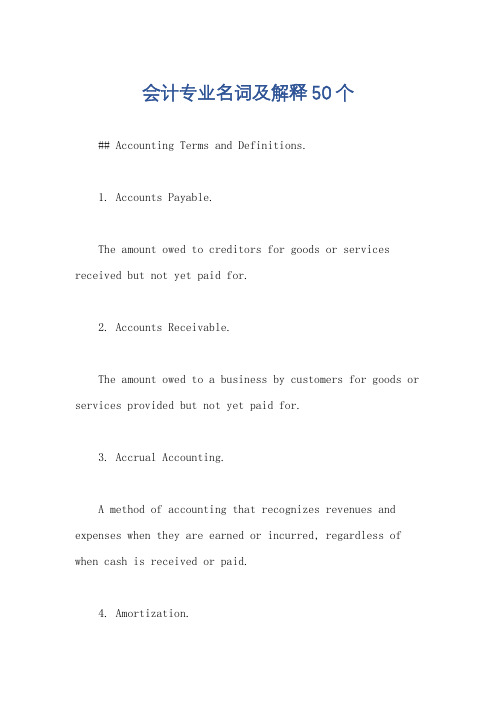
会计专业名词及解释50个## Accounting Terms and Definitions.1. Accounts Payable.The amount owed to creditors for goods or services received but not yet paid for.2. Accounts Receivable.The amount owed to a business by customers for goods or services provided but not yet paid for.3. Accrual Accounting.A method of accounting that recognizes revenues and expenses when they are earned or incurred, regardless of when cash is received or paid.4. Amortization.The process of spreading the cost of an intangible asset over its useful life.5. Assets.Anything of value that a business owns or controls.6. Audit.An independent examination of a business's financial statements to ensure their accuracy and compliance with accounting standards.7. Balance Sheet.A financial statement that shows the financial condition of a business at a specific point in time.8. Bond.A loan made by an investor to a business, typicallywith a fixed interest rate and maturity date.9. Bookkeeping.The process of recording and summarizing financial transactions.10. Capital.The amount of money invested in a business by its owners.11. Cash Flow Statement.A financial statement that shows the sources and uses of cash during a specific period of time.12. Certified Public Accountant (CPA)。
会计英语术语 -回复
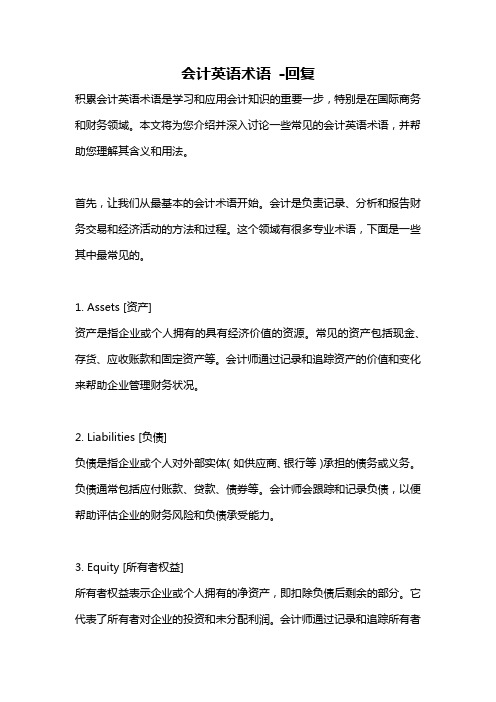
会计英语术语-回复积累会计英语术语是学习和应用会计知识的重要一步,特别是在国际商务和财务领域。
本文将为您介绍并深入讨论一些常见的会计英语术语,并帮助您理解其含义和用法。
首先,让我们从最基本的会计术语开始。
会计是负责记录、分析和报告财务交易和经济活动的方法和过程。
这个领域有很多专业术语,下面是一些其中最常见的。
1. Assets [资产]资产是指企业或个人拥有的具有经济价值的资源。
常见的资产包括现金、存货、应收账款和固定资产等。
会计师通过记录和追踪资产的价值和变化来帮助企业管理财务状况。
2. Liabilities [负债]负债是指企业或个人对外部实体(如供应商、银行等)承担的债务或义务。
负债通常包括应付账款、贷款、债券等。
会计师会跟踪和记录负债,以便帮助评估企业的财务风险和负债承受能力。
3. Equity [所有者权益]所有者权益表示企业或个人拥有的净资产,即扣除负债后剩余的部分。
它代表了所有者对企业的投资和未分配利润。
会计师通过记录和追踪所有者权益的变化来帮助评估企业的价值和盈利能力。
4. Revenue [收入]收入是指企业通过销售产品、提供服务或其他经营活动获得的资金流入。
会计师负责记录和核算收入,以便帮助评估企业的盈利能力和营运状况。
5. Expenses [费用]费用是指企业为开展日常经营活动所支出的成本或费用。
这些费用可以包括人工成本、材料成本、营销费用等。
会计师记录和追踪费用,以帮助评估企业的运营效率和成本控制能力。
有了这些基本概念的理解,我们可以进一步讨论一些会计术语的具体细节。
6. Accounts Receivable [应收账款]应收账款是指企业出售商品或提供服务后尚未收到的款项。
负责会计工作的人员通常会记录和跟踪应收账款,并定期评估其坏账风险。
7. Accounts Payable [应付账款]应付账款是指企业未支付给供应商或其他债权人的款项。
会计师会记录和跟踪应付账款,以确保按时支付债务。
会计英语术语解释
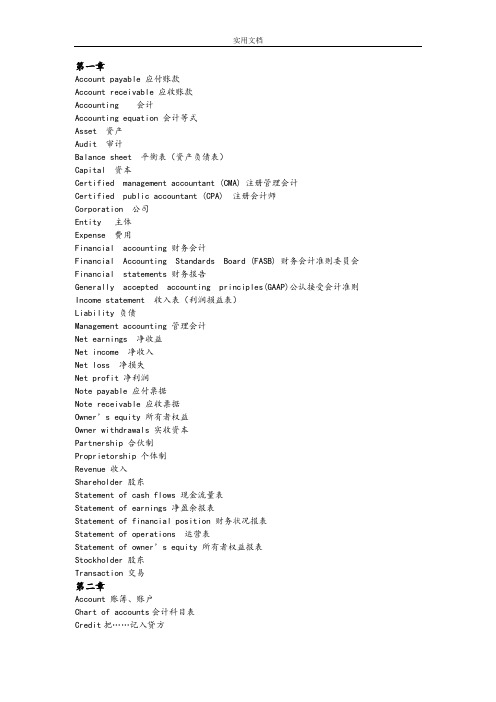
第一章Account payable 应付账款Account receivable 应收账款Accounting 会计Accounting equation 会计等式Asset 资产Audit 审计Balance sheet 平衡表(资产负债表)Capital 资本Certified management accountant (CMA) 注册管理会计Certified public accountant (CPA) 注册会计师Corporation 公司Entity 主体Expense 费用Financial accounting 财务会计Financial Accounting Standards Board (FASB) 财务会计准则委员会Financial statements 财务报告Generally accepted accounting principles(GAAP)公认接受会计准则Income statement 收入表(利润损益表)Liability 负债Management accounting 管理会计Net earnings 净收益Net income 净收入Net loss 净损失Net profit 净利润Note payable 应付票据Note receivable 应收票据Owner’s equity 所有者权益Owner withdrawals 实收资本Partnership 合伙制Proprietorship 个体制Revenue 收入Shareholder 股东Statement of cash flows 现金流量表Statement of earnings 净盈余报表Statement of financial position 财务状况报表Statement of operations 运营表Statement of owner’s equity 所有者权益报表Stockholder 股东Transaction 交易第二章Account 账簿、账户Chart of accounts会计科目表Credit把……记入贷方Debit把……记入借方Journal日记账Ledger总账、分类账Normal balance 正常余额、平衡Posting登帐、过账Trial balance 试算平衡第三章Accrual accounting 权责发生制book value(of a plant asset) 账面价值plant asset 固定资产Accrued expense 应计费用cash-basis accounting 收付实现制prepaid expense 预付费用Accrued revenue 应计收入contra account 抵消账户revenue principle 收入确认准则Accumulated depreciation累计折旧deferred revenue 递延收入time-period concept会计期间Adjusted trial balance 调整试算平衡depreciation折旧unearned revenue递延收入Adjusting entry 调整分录matching principle 配比原则第四章Accounting cycle 会计循环fixed asset固定资产plant asset 固定资产Closing the accounts 结账income summary 损益汇总账户postclosing trial balance 试算平衡Closing entries 结账分录liquidity 流动性reversing entries 转回分录Current asset 流动资产long-term asset 长期资产temporary accounts 临时性账户Current liability 流动负债long-term liability 长期负债work sheet 工作表Current ratio 流动比率operating cycle 营业周期Debt ratio 资产负债率permanent accounts 永久性账户第五章Cost of goods sold 销售成本Cost of sales 销货成本Gross margin边际收入Gross margin pencentage毛利润率Gross profit毛利润Gross profit pencentage毛利率Income from operations运营收入inventory存货inventory turnover 存货周转Invoice 发票,收据,单证Multi-step income statement多步式利润表Net purchases净销售Net sales revenue净销售收入Operating expenses运营成本Operating income 运营收入Other expense其他费用Other revenue其他收入Periodic inventory system 定期盘存制Perpetual inventory system永续盘存制sales销售Sales discount销售折扣Sales returns and allowances销售返还补贴Sales revenue 销售收入single-step income statement单步式利润表第六章Average-cost method 平均成本法Conservatism谨慎性原则Consistency principle 持续经营Disclosure principle 充分性披露(原则)Firsr-in first-out(FIFO) inventory costing method 先进先出法Weighted average inventory costing method加权平均法Gross profit method 毛利润法last-in first-out(FIFO) inventory costing method后进先出法Lower-of -cost-or-market(LCM)rule成本与市价孰低法Materiality concept重要性原则Specific indentifiction method个别确认法Specific -unit-cost method个别成本法第七章accounting information system会计信息系统batch processing 分批加工、成批处理cash disbursements journalcash payment journal 支票登记簿现金支出日记账cash receipts journal 现金收入日记账check register 支票登记簿control account 统驭账户credit memorandum or credit memo 贷方备忘录data warehouse 数据仓库database 数据库debit memorandum or debit memo 借方备忘录、借记卡备忘录Enterprise Resource Planning 企业文化、企业资源规划general journal 普通日记账general ledger 总账hardware 硬件menu 菜单module 模板network 网络online processing 在线处理、联机处理purchases journal 购货日记账sales journal 销售日记账server 服务器software 软件special journal 特种日记账、专用日记账spreadsheet 试算表subsidiary ledger 明细分类账、辅助分类账第八章audit 审计、审核bank collection 银行托收bank reconciliation 银行往来对账单、银行存款余额调节表bank statement 银行对账单、银行结算清单check 支票computer virus 计算机病毒controller 财务主管deposit in transit 在途存款electronic funds transfer 电子资金调拨系统encryption 加密firewalls 防火墙imprest system 定额备用金制度internal control 内部控制nonsufficient funds(NSF)check 空头支票outstanding check 在途支票、未兑付支票petty cash 零用现金、零用金、小额现款Trojan horse 木马、特洛伊木马voucher 付款凭证、传票、凭单第九章Acid-test ratio酸性测试比率Aging-of-accounts method账龄分析法Allowance of Doubtful Accounts坏账准备Allowance for uncollectible accounts坏账准备Allowance method备抵法Bad-debt expense坏账损失Balance-sheet approach决算表平衡法Collection period收账日期Creditor债权人Day’s sales in receivables应收账款周转天数Debtor债务人Default on a note不履行付款义务Direct write-off method直接注销法Discounting a note receivable应收票据折价Dishonor of a note 没有追索权Doubtful-account expense呆账费用Due date到期日Income-statement approach损益表方法Interest利息Interest period计息期Interest rate利率Maker of a note出票人Maturity date到期日Maturity value到期价值Note term票据条款Payee of a note持票人(收款票据)Percent-of-sales method销货百分比法Principal本金Principal amount本金金额Promissory note本票Quick ratio速动比率Receivables应收账款Time时间Uncollectible-account expense坏账损失第十章Accelerated depreciation method快速折旧法Amortization摊销Brand names商标名Capital expenditure资本支出Copyright版权Depletion expense折耗费Depreciable cost折旧成本Double-declining-balance(DDB)depreciation method双倍余额递减法Estimated residual value估计残值Estimated useful life估计使用年限Extraordinary repair非常维修Franchises特许权Goodwill商誉Intangibles无形资产Licenses授权Ordinary repair普通修理Patent专利Plant assets固定资产Salvage value残值Straight-line (SL)depreciation method直线法折旧Trademark商标Trade name商标名Units-of-production (UOP)depreciation method单位产量法第十一章accrued expense 应计费用、预提费用accrued liability 应计负债current portion of long-term debt 长期负债中一年内到期的部分current maturity 本期或一年内到期employee compensation 雇员薪酬FICA tax 联邦保险捐助税gross pay 工资的毛收入net pay 净支出payroll 工薪、工资short-term note payable 短期应付票据Social Security tax 社会保险税unemployment compensation tax 事业补偿税withheld income tax 预扣收入税第十三章additional paid-in capital 股本溢价authorization of stock 授权股票board of directors 董事book value 账面价值bylaws 规章、章程chairperson 主席charter 特许权、授权common stock 普通股contributed capital 已投股本cumulative preferred stock 累计优先股deficit 赤字、亏空dividends 股利double taxation 双重税收legal capital 法定资本limited liability 有限责任market value 市场价值outstanding stock 发行在外股票paid-in capital 实收资本par value 票面价值、面值preferred stock 优先股president 总裁、董事长rate of return on common stockholders’equity普通股收益率rate of return on total assets 资产回报率retained earnings 留存收益return on assets 资产回报return on equity 所有者权益回报shareholder 股东stated value设定价值、宣称价值、无票面值股票stock 股票stockholder 股东、股票持有者stockholders’ equity 所有者权益第十四章Appropriation of retained earnings 分类盈余Comprehensive income 毛利润,综合收入Earnings per share (EPS)每股收益Extraordinary gains and losses 营业外收入/支出Extraordinary item 异常项目Prior-period adjustment 先期调整Segment of the business 经营部门Statement of stockholders’ equity 所有者权益状况变动表Stock dividend 股票股利Stock split 股票分割(折分)Treasury stock 库藏股第十五章Bond discount 债券折价Bond premium 债券溢价Bonds payable 应付债券Callable bonds 可回购债券Capital lease 融资租赁Convertible bonds 可转换债券Debentures 信用债券(无担保债券)Discount(on a bond)折价Effective interest rate 有效利(息)率Lease 租赁Lessee 承租人Lessor 出租人Leverage 杠杆Market interest rate 投资者实际回报率Mortgage 抵押Operating lease 经营性租赁Premium 溢价Present value 现值Serial bonds 系列债券Stated interest rate 票面利息率Term bonds 定期债券第十六章available-for-sale investments 可供出售投资(不以控制为目的)consolidated statements 合并会计报表controlling interest 主权益equity method 权益法foreign-currency exchange rate 汇率hedging 套期保值held-to-maturity investments 持有至到期投资long-term investment 长期投资majority interest 主权益marketable security 短期投资market-value method 市场法minority interest 小股东权益parent company 母公司short-term investment 短期投资strong currency 强通货subsidiary company 分(子)公司trading investments 短期投资weak currency 疲软货币第十八章accounts receivable turnover 应收账款周转率acid-test ratio 酸性测试比率benchmarking 标杆儿book value per share of common stock 普通股每股帐面价值capital charge 资本成本collection period 回收期common-size statement 比率报表cost of capital 资本成本current ratio 流动比率days' sales in receivables 应收账款周转天数debt ratio 资产负债率dividend yield 股利收益率earnings per share(EPS) 每股收益economic value added(EVA) 经济附加值horizontal analysis 平行分析interst-coverage ratio 利息覆盖率inventory turnover 存货周转率leverage 杠杆price/earnings ratio 市盈率,价格/收益比率quick ratio 速动比率rate of return on common stockholders equity 普通股东权益报酬率rate of return on net sales 销售利润率return on assets (ROA)资产回报率return on equity (ROE)所有者权益回报率,资本权益报酬率return on sales 销货收益率rate of return on total assets 资产总额利润报酬率,总资产报酬率return on stockholders' equity 股东权益回报times-interest-earned ratio 利息获得倍数比率trading on the equity 借款扩大资本trend percentages 趋势比率vertical analysis 垂直分析,静态分析,纵向分析working capital 营运资本,营运资金。
accounting名词解释英语
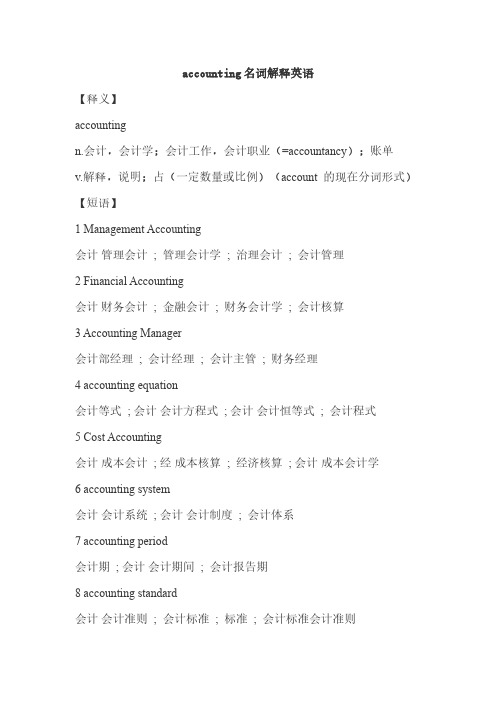
accounting名词解释英语【释义】accountingn.会计,会计学;会计工作,会计职业(=accountancy);账单v.解释,说明;占(一定数量或比例)(account的现在分词形式)【短语】1Management Accounting会计管理会计;管理会计学;治理会计;会计管理2Financial Accounting会计财务会计;金融会计;财务会计学;会计核算3Accounting Manager会计部经理;会计经理;会计主管;财务经理4accounting equation会计等式;会计会计方程式;会计会计恒等式;会计程式5Cost Accounting会计成本会计;经成本核算;经济核算;会计成本会计学6accounting system会计会计系统;会计会计制度;会计体系7accounting period会计期;会计会计期间;会计报告期8accounting standard会计会计准则;会计标准;标准;会计标准会计准则9public accounting会计公共会计;公众会计;大众管帐;公家会计【例句】1The debate revolves around specific accounting techniques.这场讨论围绕具体的会计技巧。
2But full cost accounting will be introduced without delay.但是,全面成本核算马上将被采用。
3Most large companies now use computers for accounting and housekeeping operations.多数大公司现在用计算机进行会计运算和内务操作。
4An understanding of accounting techniques is a requisite for the work of the analysts.对核算技术的理解对于分析师的工作是必需的。
会计名词术语表,中英文对照
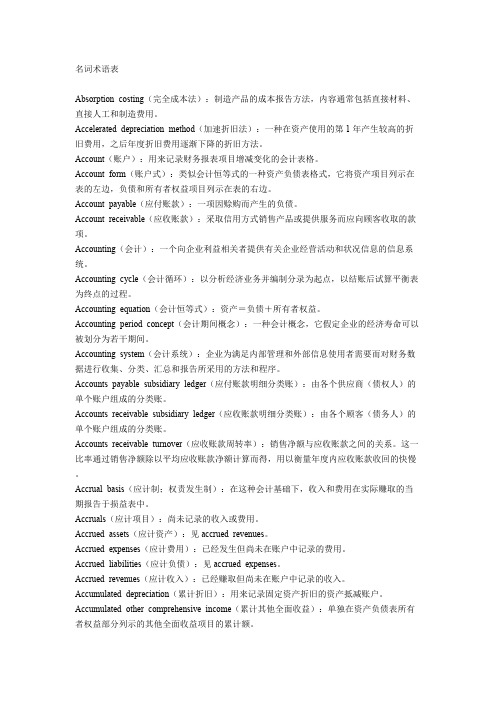
名词术语表Absorption costing(完全成本法):制造产品的成本报告方法,内容通常包括直接材料、直接人工和制造费用。
Accelerated depreciation method(加速折旧法):一种在资产使用的第1年产生较高的折旧费用,之后年度折旧费用逐渐下降的折旧方法。
Account(账户):用来记录财务报表项目增减变化的会计表格。
Account form(账户式):类似会计恒等式的一种资产负债表格式,它将资产项目列示在表的左边,负债和所有者权益项目列示在表的右边。
Account payable(应付账款):一项因赊购而产生的负债。
Account receivable(应收账款):采取信用方式销售产品或提供服务而应向顾客收取的款项。
Accounting(会计):一个向企业利益相关者提供有关企业经营活动和状况信息的信息系统。
Accounting cycle(会计循环):以分析经济业务并编制分录为起点,以结账后试算平衡表为终点的过程。
Accounting equation(会计恒等式):资产=负债+所有者权益。
Accounting period concept(会计期间概念):一种会计概念,它假定企业的经济寿命可以被划分为若干期间。
Accounting system(会计系统):企业为满足内部管理和外部信息使用者需要而对财务数据进行收集、分类、汇总和报告所采用的方法和程序。
Accounts payable subsidiary ledger(应付账款明细分类账):由各个供应商(债权人)的单个账户组成的分类账。
Accounts receivable subsidiary ledger(应收账款明细分类账):由各个顾客(债务人)的单个账户组成的分类账。
Accounts receivable turnover(应收账款周转率):销售净额与应收账款之间的关系。
这一比率通过销售净额除以平均应收账款净额计算而得,用以衡量年度内应收账款收回的快慢。
大一会计英语知识点

大一会计英语知识点一、基本财务会计术语1. 资产(Assets):指企业拥有并且具备经济利益的资源,包括现金、存货、应收账款等。
2. 负债(Liabilities):指企业应对他人负有经济责任的现象,如应付账款、借款等。
3. 资本(Equity):指企业拥有者对企业净资产的所有权,也即企业的净值。
4. 收入(Revenue):指企业在日常经营活动中所获得的经济利益。
5. 成本(Cost):指企业为了生产或销售商品或提供服务而发生的成本支出。
6. 费用(Expense):指企业除了成本以外的其他支出,如各种管理费用、销售费用等。
二、会计报表1. 资产负债表(Balance Sheet):用于反映企业在特定日期上资产、负债和所有者权益的状况。
资产负债表公式:资产 = 负债 + 所有者权益。
2. 损益表(Income Statement):用于反映企业在特定会计期间的收入、费用和净利润(或净亏损)。
损益表公式:收入 - 费用 = 净利润(或净亏损)。
3. 现金流量表(Cash Flow Statement):用于反映企业在特定会计期间内现金流入流出的情况,以及现金的净增减额。
4. 综合收益表(Statement of Comprehensive Income):用于反映企业在特定会计期间内各种综合收益项目的情况。
三、会计原则与规范1. 会计实体原则(Entity principle):企业与企业主的经济活动应该分开处理。
2. 货币计量原则(Monetary unit principle):会计记录应该以货币为计量单位。
3. 会计时期原则(Accounting period principle):会计工作应该按照一定的时间周期进行,如年度、季度等。
4. 成本原则(Cost principle):企业的会计记录应该按照实际成本进行,不考虑市场价值的波动。
5. 全面损益原则(Full disclosure principle):企业的财务报表应该披露所有必要的信息,以提供给用户做出正确决策的依据。
常用会计英语名词解释
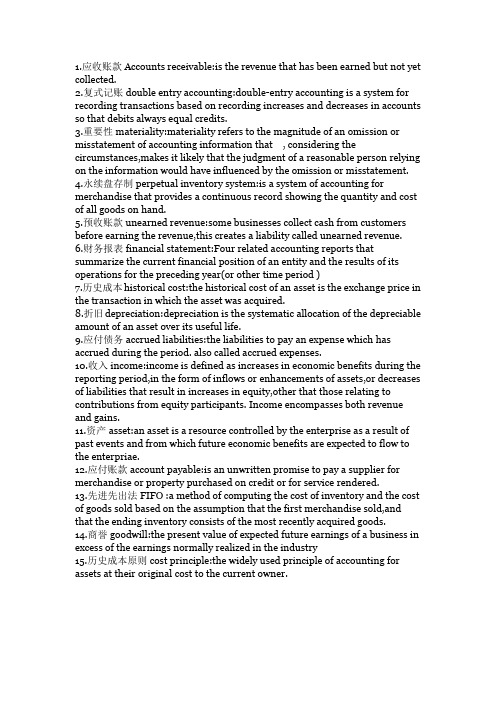
1.应收账款Accounts receivable:is the revenue that has been earned but not yet collected.2.复式记账double entry accounting:double-entry accounting is a system for recording transactions based on recording increases and decreases in accounts so that debits always equal credits.3.重要性materiality:materiality refers to the magnitude of an omission or misstatement of accounting information that , considering the circumstances,makes it likely that the judgment of a reasonable person relying on the information would have influenced by the omission or misstatement.4.永续盘存制perpetual inventory system:is a system of accounting for merchandise that provides a continuous record showing the quantity and cost of all goods on hand.5.预收账款unearned revenue:some businesses collect cash from customers before earning the revenue,this creates a liability called unearned revenue.6.财务报表financial statement:Four related accounting reports that summarize the current financial position of an entity and the results of its operations for the preceding year(or other time period )7.历史成本historical cost:the historical cost of an asset is the exchange price in the transaction in which the asset was acquired.8.折旧depreciation:depreciation is the systematic allocation of the depreciable amount of an asset over its useful life.9.应付债务accrued liabilities:the liabilities to pay an expense which has accrued during the period. also called accrued expenses.10.收入income:income is defined as increases in economic benefits during the reporting period,in the form of inflows or enhancements of assets,or decreases of liabilities that result in increases in equity,other that those relating to contributions from equity participants. Income encompasses both revenue and gains.11.资产asset:an asset is a resource controlled by the enterprise as a result of past events and from which future economic benefits are expected to flow to the enterpriae.12.应付账款account payable:is an unwritten promise to pay a supplier for merchandise or property purchased on credit or for service rendered.13.先进先出法FIFO :a method of computing the cost of inventory and the cost of goods sold based on the assumption that the first merchandise sold,and that the ending inventory consists of the most recently acquired goods.14.商誉goodwill:the present value of expected future earnings of a business in excess of the earnings normally realized in the industry15.历史成本原则cost principle:the widely used principle of accounting for assets at their original cost to the current owner.。
会计英语的名词解释
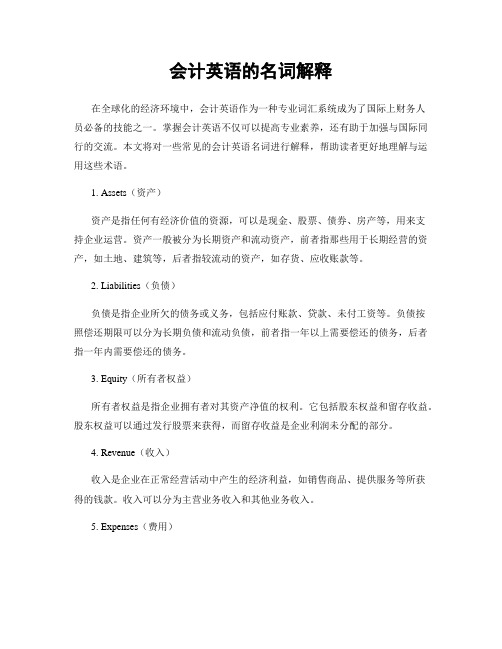
会计英语的名词解释在全球化的经济环境中,会计英语作为一种专业词汇系统成为了国际上财务人员必备的技能之一。
掌握会计英语不仅可以提高专业素养,还有助于加强与国际同行的交流。
本文将对一些常见的会计英语名词进行解释,帮助读者更好地理解与运用这些术语。
1. Assets(资产)资产是指任何有经济价值的资源,可以是现金、股票、债券、房产等,用来支持企业运营。
资产一般被分为长期资产和流动资产,前者指那些用于长期经营的资产,如土地、建筑等,后者指较流动的资产,如存货、应收账款等。
2. Liabilities(负债)负债是指企业所欠的债务或义务,包括应付账款、贷款、未付工资等。
负债按照偿还期限可以分为长期负债和流动负债,前者指一年以上需要偿还的债务,后者指一年内需要偿还的债务。
3. Equity(所有者权益)所有者权益是指企业拥有者对其资产净值的权利。
它包括股东权益和留存收益。
股东权益可以通过发行股票来获得,而留存收益是企业利润未分配的部分。
4. Revenue(收入)收入是企业在正常经营活动中产生的经济利益,如销售商品、提供服务等所获得的钱款。
收入可以分为主营业务收入和其他业务收入。
5. Expenses(费用)费用是企业为了开展正常经营活动而发生的支出,如工资、租金、采购成本等。
费用可以分为直接费用和间接费用,前者指与产品生产直接相关的费用,后者指与产品生产间接相关的费用。
6. Depreciation(折旧)折旧是指某种固定资产按照一定的标准逐年减少其价值的过程。
折旧费用会计上被逐年分摊在企业的成本中,以反映固定资产的使用寿命与价值的变化。
7. Amortization(摊销)摊销是指对某类资产进行逐年分配的过程,以反映其价值随时间的减少。
摊销一般适用于有限生命周期的资产,如专利权、版权等。
8. Audit(审计)审计是一项独立的、客观的评估,用于确定企业的财务报表是否符合会计准则和法律法规的规定。
审计旨在验证企业的财务信息的真实性与准确性。
会计笔记英语知识点大全

会计笔记英语知识点大全会计是一门重要的商科学科,会计笔记是会计学习中的重要组成部分。
在学习会计的过程中,掌握会计笔记的英语知识点对于提高学习效果和职业发展都有很大帮助。
本文将为您介绍会计笔记英语知识点的大全,希望对广大会计从业人员和学生有所帮助。
一、基本会计概念的英语表达1. 会计 (Accounting)会计是一门记录、分类和分析财务信息的学科。
2. 账户 (Account)账户是用于记录和汇总相关财务信息的记录单元。
3. 资产 (Asset)资产是企业所拥有的可预期经济利益。
4. 负债 (Liability)负债是企业所欠他人的债务。
5. 所有者权益 (Equity)所有者权益是企业所拥有的资产减去负债后所剩余的权益。
6. 收入 (Revenue)收入是企业在销售商品或提供服务时所获得的经济利益。
7. 支出 (Expense)支出是企业为取得收入而发生的或与经营业务有关的费用。
二、会计科目的英语表达1. 资产科目 (Asset Accounts)资产科目包括现金、应收账款、存货、固定资产等。
2. 负债科目 (Liability Accounts)负债科目包括应付账款、长期负债等。
3. 所有者权益科目 (Equity Accounts)所有者权益科目包括股东投资、净利润等。
4. 收入科目 (Revenue Accounts)收入科目包括销售收入、服务收入等。
5. 支出科目 (Expense Accounts)支出科目包括工资支出、租金支出等。
三、会计凭证的英语表达1. 借方 (Debit)借方是会计凭证上记载“增加”或“支出”的一方。
2. 贷方 (Credit)贷方是会计凭证上记载“减少”或“收入”的一方。
3. 手工记账 (Manual Accounting)手工记账是指使用纸质或电子表格进行会计凭证录入的操作。
4. 自动记账 (Automated Accounting)自动记账是指使用会计软件或系统进行会计凭证录入的操作。
会计名词解释
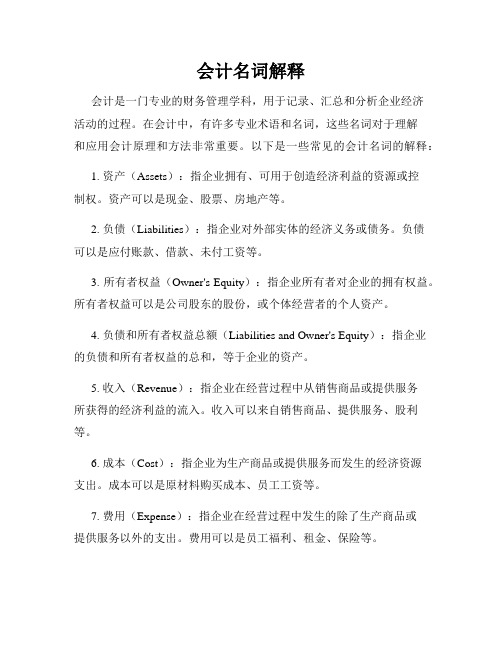
会计名词解释会计是一门专业的财务管理学科,用于记录、汇总和分析企业经济活动的过程。
在会计中,有许多专业术语和名词,这些名词对于理解和应用会计原理和方法非常重要。
以下是一些常见的会计名词的解释:1. 资产(Assets):指企业拥有、可用于创造经济利益的资源或控制权。
资产可以是现金、股票、房地产等。
2. 负债(Liabilities):指企业对外部实体的经济义务或债务。
负债可以是应付账款、借款、未付工资等。
3. 所有者权益(Owner's Equity):指企业所有者对企业的拥有权益。
所有者权益可以是公司股东的股份,或个体经营者的个人资产。
4. 负债和所有者权益总额(Liabilities and Owner's Equity):指企业的负债和所有者权益的总和,等于企业的资产。
5. 收入(Revenue):指企业在经营过程中从销售商品或提供服务所获得的经济利益的流入。
收入可以来自销售商品、提供服务、股利等。
6. 成本(Cost):指企业为生产商品或提供服务而发生的经济资源支出。
成本可以是原材料购买成本、员工工资等。
7. 费用(Expense):指企业在经营过程中发生的除了生产商品或提供服务以外的支出。
费用可以是员工福利、租金、保险等。
8. 损益表(Income Statement):也称为利润表或收入支出表,用于显示企业在一定时期内的收入、费用和利润情况。
9. 资产负债表(Balance Sheet):也称为财务状况表,用于显示企业在某一特定日期的资产、负债和所有者权益的状况。
10. 现金流量表(Statement of Cash Flows):用于显示企业在一定时期内的现金流入和流出情况,反映企业的经营现金流量状况。
11. 折旧(Depreciation):指由于资产的使用和年限,导致其价值减少的过程。
折旧费用是用于反映资产价值减少的成本。
12. 净利润(Net Profit):指企业在一定时期内的总收入减去总费用后的盈余。
(仅供参考)会计专业英语名词解释

会计专业英语名词解释Chapter 11. Accounting: Accounting is the process of identifying, measuring, recording, andcommunicating economic information to permit informed judgments and decisions by users of the information.2. Accrual basis accounting: Accrual basis accounting refers to an accounting methodthat records financial events based on economic activity rather than financial activity.Under accrual accounting, revenue is recorded when it is earned and realized, regardless of when actual payment is received. Similarly, expenses are matched with revenue regardless of when they are actually paid.3. Balance sheet: Balance sheet is the financial statement showing the financial positionof an entity by summarizing its assets, liabilities, and owner’s equity at one sp ecific date.4. Business entity: Business entity refers to an economic unit that controls resources,incurs obligations, and engages in business activities.5. CAS: Chinese Accounting Standards refer to the accounting concepts, measurementtechniques, and standards of presentation used in financial statements made by the PRC Financial Apartment.6. Cash basis accounting: Cash basis accounting is a method of bookkeeping thatrecords financial events based on cash flows and cash position. Revenue is recognized when cash is received and expense is recognized when cash is paid out.7. Conservatism: Conservatism states that when alternative accounting valuations areequally possible, the accountant should select the one that is least likely to overstate assets and income in the current period.8. Consistency: Consistency means that a company uses the same accountingprinciples and methods from year to year.9. Continuity: Continuity refers to an accounting assumption, also known as thegoing-concern assumption, that the company will continue to operate in the near future, unless substantial evidence to the contrary exists.10. Corporation: Corporation is a business organized as a separate legal entity understate corporation law and having ownership divided into transferable shares of stock.11. Cost principle: Cost principle is a widely used principle of accounting for assets at theiroriginal cost to the current owner.12. Financial accounting: Financial accounting refers to the development and use ofaccounting information describing the financial position of an entity and the results of its operations.13. Financial position: Financial position refers to the financial resources and obligationsof an organization, as described in a balance sheet.14. Financial reporting: Financial reporting refers to the process of periodically providing“general-purpose”financial information (such as financial statements) to persons outside the business organization.15. Financial statements: Financial statements refer to the four related accounting reportsthe summarize the current financial position of an entity and the results of its operations for the preceding year ( or other time period).16. Full disclosure principle: Full disclosure principle requires that circumstances andevents that make a difference to financial statement users be disclosed.17. Going-concern assumption: Go-concern assumption is an assumption by accountantsthat a business will operate indefinitely unless specific evidence to the contrary, such as impending bankruptcy, exists.18. Historical cost: The historical cost of an asset is the exchange price in the transactionin which the asset was acquired.19. Matching principle: Matching principle is an accounting principle that dictates thatexpenses be matched with revenue in the period in which efforts are made to generate revenue.20. Materiality: Materiality refers to the magnitude of an omission or misstatement ofaccounting information that, considering the circumstances, makes it likely that the judgment of a reasonable person relying on the information would have been influenced by the omission or misstatement.21. Market value: Market value is the estimated amount for which a property shouldexchange on the date of valuation between a willing buyer and a willing seller in an arm’s-length transaction after proper marketing wherein the parties had each acted knowledgeably, prudently, and without compulsion,22. Net realizable value: The net realizable value of an asset is the amount of cash (or theequivalent) that could be obtained on the date of the balance sheet by selling the asset in its present condition, in an orderly liquidation.23. Income statement: Income statement is a financial statement indicating theprofitability of a business over a preceding time period.24. Partnership: Partnership is a business owned by two or more persons associated aspartners.25. Present value: The present value of an asset is the net amount of discounted futurecash inflows less the discounted future cash outflows relating to the asset.26. Proprietorship: Partnership is a business owned by one person.27. Relevance: Accounting information is relevant if it can make a difference in a decisionby helping users predict the outcomes of past, present, and future events or confirm or correct prior expectations. To be relevant, accounting information should have either predictive or feedback value, or both. In addition, it should be timely,28. Reliability: Reliable information is reasonably free from error and bias, and faithfullyrepresents what it is intended to represent. That is, to be reliable, information should be verifiable, neutral, and possess representational faithfulness,29. Revenue recognition principle: An accounting principle that dictates that revenue berecognized in the accounting period in which it is earned.30. Statement of cash flow: A financial statement summarizing the cash receipts and cashpayments of the business over the same time period covered by the income statement.31. Statement of owner’s equity: A financial statement explaining certain changes in theamount of the owner’s equity (investment) in the business.1. Asset: Assets mean the entire property of a person, association, corporation, or estateapplicable or subject to the payment of debts.2. Operating cycle: The operating cycle is the time span from when cash is used toacquire goods and service and until cash is received from the sale of goods and service.3. Cash: cash refers to an exchange medium launched into circulation which is availablefor any ordinary use and can be used to purchase goods or services or repay debts.4. Cash equivalents: Cash equivalents are short-term, highly liquid investments or otherassets that readily convertible to cash and sufficiently close to their due date.5. Internal control: Internal control means all policies and procedures used to protectassets, ensure reliable accounting, promote efficient operations, and urge adherence to company policies.Chapter 31. Receivables: Receivables refer to the monetary claims against business, individualsand other debtors.2. Accounts receivable: Accounts receivables are amounts due from customers for creditsales. This section begins by describing how accounts receivables occur. It includes receivables that occur when customers use credit cards issued by third parties and when a company gives credit directly to customers.3. Installment accounts receivables: Installment accounts receivables are amounts overan extended time period.4. Commercial discounts: Commercial discounts refer to a certain sum of moneydeducted from listed prices.5. Cash discounts: Cash discounts refer to a deduction from gross invoice price, whichare an inducement offered to the buyer to encourage the payments of goods within a specific period of time.6. The percentage-of-sale method: The percentage-of-sale method estimates somepercentage of credit sales would turn out to be uncollectible, in which the percentage of bad debts to credit sales should be properly estimated with the past experience. 7. The percentage-of-receivable method: The percentage-of-receivable methodestimates the uncollectible with a percentage of the ending balance of accounts receivables rather than credit sales.8. The aging method: The aging method analyzes the age structure of the accountbalance. In this method, an aging schedule is prepared, classifying the length of time that has passes since the sale that gave rise to them.9. The allowance method: The allowance method is the most usual way that companiesuse to record uncollectible accounts. In calculating uncollectible accounts, an account allowances for uncollectible receivable is set up.10. Promissory note: A promissory note is a written promise to pay a certain sum ofmoney on demand or at a fixed and determinable future time, generally over 30 or 60 days.1. Inventory: Inventory is the total amount if goods and/or materials contained in a storeor factory at any given.2. Product costs: Product costs are those costs that “attach”to the inventory. Suchcharges include freight charges on goods purchased, other direct costs of acquisition, and labor and other production costs incurred in processing the goods up to the time of sale.3. The perpetual inventory system: The perpetual inventory system requires thatseparate inventory ledger be maintained for each goods.4. The periodic inventory system: The periodic inventory system requires a companydetermines the quantity of inventory on hand only periodically, under which the cost of ending inventory is subtracted from the cost of goods available for sale, then the cost of goods sold are determined.5. The specific identification method: The specific identification method can be usedwhen units in the ending inventory can be identified as coming from specific purchases.6. The weighted average cost method: The weighted average cost method assumes thatthe goods available for sale have the same cost per unit. Under this method, the cost of goods available for sale is allocated on the basis of the weighted-average unit c0st.7. The first-in, first-out (FIFO) method: The first-in, first-out (FIFO) method is base on theassumption that the costs of the first items acquired should be assigned to the first item sold.Chapter 51. Accelerated depreciation: Accelerated depreciation is a method of depreciation thatcall for recognition of relatively large amounts if depreciation in the early years of an asset’s useful life and relatively small amounts in the later years.2. Depreciable value: Depreciable value is the amount of the acquisition cost to beallocated as depreciation over the total useful life of an asset. It is the difference between the total acquisition cost and the estimated residual value.3. Depreciation: Depreciation is the systematic allocation of the cost of an asset toexpress over the years of its estimated useful life.4. Fair market value: Fair market value is the value of an asset based on the price forwhich a company could sell the asset to an independent third party.5. Impairment: Impairment is a change in economic conditions which reduces theeconomic usefulness of an asset.6. Residual value: Residual value is the amount a company expects to receive fromdisposal of an asset at the end of its useful life.7. Useful life: Useful life refers to the shorter of the physical life or the economic life of anasset.1. Amortization: The systematic write-off to expense of the cost of an intangible assetover the period of its economic usefulness.2. Copyright: A grant by the state government covering the right to publish, sell, orotherwise control literary or artistic products for the life of the author plus 50 years. 3. Franchises: Agreements entered into by two parties in which, for a fee, one party (thefranchisor) gives the other party (the franchisee) rights to perform certain functions or sell certain products or services.4. Goodwill: The present value of expected future earnings of a business in excess of theearnings normally realized in the industry.5. Identifiable intangible asset: Intangibles that can be purchased or sold separately fromthe other assets of the company.6. Intangible assets: Those assets which are used in the operation of a business butwhich have no physical substance and are not current.7. Leases (or leaseholds): Intangible assets because a right to use the property is heldby the lessee.8. Patent: An exclusive right granted by the state government giving the owner control ofthe manufacturing, sale, or other use of an invention for a period of years from the date of filling.9. Research and development costs: Expenditures that may lead to patent, copy rights,new processes and new products.10. Trademarks: Distinctive identifications of a manufactured product or of a service,taking the form of a name, a sign, a slogan, a logo, or an emblem.Chapter 71. Available-for-sale securities: Securities that may be sold in the future.2. Consolidated financial statements: Financial statements that present the assets andliabilities controlled by the parent company and the aggregate profitability of the affiliated companies.3. Cost method: An accounting method in which the investment in common stock isrecorded at cost and revenue is recognized only when cash dividends are received.4. Debt investments: Investments in government and corporation bonds.5. Equity method: An accounting method in which the investment in common stock isinitially recorded at cost and the investment account is then adjusted annually to show the investor’s equity in the investee.6. Fair value: Amount for which a security could be sold in a normal market.7. Held-to-maturity securities: Debt securities that investor has the intent and ability tohold to maturity.8. Investment portfolio: A group of stocks in different corporations held for investmentpurposes.9. Long-term investments: Investments that are not readily marketable and thatmanagement does not intend to convert into cash within the next year or operating cycle, whichever is longer.10. Parent company: A company that owns more than 50% of the common stock ofanother entity.11. Short-term investments: Investments that are readily marketable and intend to convertinto cash within the next year or operating cycle, whichever is longer.12. Stock investments: Investments in the capital stock of corporations.13. Subsidiary (affiliated) company: A company in which more than 50% of its stock isowned by another company.14. Trading securities: Securities bought and held primarily for sale in the near term togenerate income on short-term price differences.Chapter 81. Amortization table: A schedule that indicates how installment payments are allocatedbetween interest expense and repayments of principal.2. Capital lease: A lease contract which, in essence, finances the eventual purchase bythe lessee of leased property. The lessor accounts for a capital lease as a sale of property; the lessee records an asset and a liability equal to the present value of the future lease payments. A capital lease is also called a financing lease.3. Commercial paper: Very short-term notes payable issued by financially strongcorporations. They are highly liquid from the investor’s point of view.4. Commitments: Contracts for the future transactions.5. Contra-liability account: A ledger account which is deducted from or offset against arelated liability account in the balance sheet; for example, Discount on Notes Payable.6. Convertible bond: One which may be changed at the option of the bondholder for aspecific number of shares of common stock.7. Deferred income taxes: Income taxes upon income which already has been reportedfor financial reporting purposes, but which will not be reported in income tax returns until future periods.8. Discount on notes payable: A contra-liability account representing any interestcharges applicable to future periods included in the face amount of a note payable.Over the life of the note, the balance of the Discount on Notes Payable account is amortized into Interest Expense.9. Deducted bond: Debenture bonds refer to an unsecured bond.10. Estimated liabilities: Liabilities which appear in financial statements at estimatedamounts.11. Long-term liabilities: Obligations that are not due for at least a year.12. Loss contingency: A possible loss, or expense, stemming from past events, that willbe resolved as to existence and amount by some future event.13. Mortgage bonds: Bonds secured by the pledge of specific assets.14. Operating lease: A lease contract which is in essence a rental agreement. The lesseehas the use of the leased property, but the lessor retains the usual risks and rewards of ownership. The periodic lease payments are accounted for as rent expense by the lessee and as rental revenue by the lessor.Chapter 91. Income: Income is defined as increases in economic benefits during the reportingperiod in the form of inflows or enhancements of assets or decreases of liabilities that result in increases in equity, other than those relating to contributions from equity participants. Income encompasses both revenue and gains.2. Revenue: Revenue is income that arises in the course of ordinary activities of anentity and is referred to by a variety of different names including sales, fees, interest, dividends and royalties.3. Gains: Gains represent other items that meet the definition of income and may, or maynot arise in the course of the ordinary activities of an entity.4. Accrued revenue: Accrued revenue is the revenue that has been earned but not yetcollected.5. Trade discounts: Trade discounts depend on the volume of the business or size oforder from the customer.6. Cash discounts: Cash discounts are offered to customers by some companies toencourage prompt payment of bills.7. Expenses: Expenses are outflows or using up of assets as part of operations of abusiness to generate sales.8. Employee expenses: Employee expenses are the entitlements which employeesaccumulate as a result of rendering their services to an employer.9. Depreciation (amortization): Depreciation is a periodic expense of operations and isassociated with the consumption or loss of service potential of non-current assets. 10. Bad (doubtful) debts expense: Bad debts expense is, in effect, a reduction of the“receivables” asset.11. Income taxes expense: Income taxes expense is the expense recognized in theaccounting records on an accrual basis that applies to income from continuing operations.12. Profit: Profit is the ultimate result of various operating activities of the enterprise in areporting period.13. Accounting policies: Accounting policies are the specific principles, bases,conventions, rules and practices adopted by an entity in preparing and presenting financial statements.14. Applicable profit: Applicable profit is assets that can be distributed to all kinds ofbeneficiaries.Chapter 101. Owner’s equity: Owner’s equity refers to the sources invested by owners or formed inthe course of the production and operation or other sourced shared by owners.2. Par value: The par value is an arbitrary dollar amount assigned to each share.3. Treasury stock: Treasury stock may be defined as shares of a corporation’s owncapital stock that have been issued and later reacquired by the issuing company but that have not been canceled or permanently retired.4. Capital reserve: Capital reserve refers to the capital which isn’t viewed as the paid-incapital or capital stock.5. Undistributed profit: Undistributed profit is the profit that is not distributed toshareholders but retained to the later years.Journal entries1. A company had the following transactions during January: Using the net method ofrecording purchases, prepare the journal entries to record these January transactions.Jan.2 Purchased merchandise, invoice price of $20 000, with terms 2/10, n/30.4 Received a credit memorandum for $4 000, the invoice price on merchandisereturned from the purchase of January 2.12 Purchased merchandise, invoice price of $15 000, with terms 3/15, n/30.26 Paid for the merchandise purchased on January 12.30 paid for the merchandise purchased on January 2.Answer:Jan.2 Merchandise …………………………………………………….19 600Accounts payable………………………………………………………19 6004 Accounts payable…………………………………………………3 920Merchandise………………………………………………………………3 92012 Merchandise……………………………………………………..14 550Accounts payable………………………………………………………14 55026 Accounts payable………………………………………………..14 550Cash……………………………………………………………………..14 55030 Accounts payable………………………………………………..15 680Expense (400)Cash………………………………………………………………………16 0802. The following series of transactions occurred during 2010 and 2011, when LinwoodCo. sold merchandise to John Moore. Linwood’s annual accounting period ends on December 31.10/01/2010 Sold $12 000 of merchandise to John Moore, terms 2/10, n/3011/15/2010 Moore reports that he cannot pay the account until the early next year. He agrees to exchange the account for a 120-day, 12% note receivable.12/31/2010 Prepared the adjusting journal entry to record accrued interest on the note.03/15/2011 Linwood receives a check from Moore for the maturity value (with interest) of the note.03/22/2011 Linwood receives notification that Moore’s check is being returned for nonsufficient funds (NSF).12/31/2011 Linwood writes off Moore’s account as uncollectible.Prepared Linwood Co.‘s journal entries to record the above transactions.The company uses the allowance method to account for its bad debt expenses.Answer:Oct.1, 2010 Accounts receivable—Moore……………………………..12 000Sales……………………………………………………………..12 000 Nov.15, 2010 Notes receivable……………………………………………12 000Accounts receivable—Moore........................................12 000 Dec.31,2010 Interest receivable (184)Interest revenue (184)($12 000 x 0.12 x 46/360 = $184)Mar.15, 2011 Cash…………………………………………………………..12 480Notes receivable………………………………………………...12 000Interest receivable (184)Interest earned (296)($12 000 x 0.12 x 74/360 = $296)Mar.22, 2011 Accounts receivable—Moore……………………………….12 480Cash…………………………………………………………….12 480 Dec.31, 2011 Allowance for doubtful accounts……………………………12 480Accounts receivable—Moore…………………………………12 4803. (a) A company purchased a patent on January 1, 2006, for $2 500 000. The patent’slegal life is 20 years but the company estimates that the patent’s useful life will only be5 years from the date of acquisition. On June 30, 2006, the company paid legal costsof $162 000 in successfully defending the patent in an infringement suit. Prepare the journal entry to amortize the patent at year end on December 31, 2006.(b) Suxia Company purchased a franchise from Yanyan Food Company for $400 000on January 1, 2006. The franchise is for an indefinite time period and gives Suxia Company the exclusive rights to sell Yanyan Wings in a particular territory. Prepare the journal entry to record the acquisition of the franchise and any necessary adjusting entry at year end on December 31, 2006.(c) Chenghe Company incurred research and development costs of $500 000 in 2006in developing a new product. Prepare the necessary journal entries during 2006 to record these events and any adjustments at year end on December 31, 2006.Answer:JOURNAL ENTRIES(a) December 31, 20×6Amortization Expense …………………………………………..518 000Patent………………………………………………………………… 518 000 (To record patent amortization.)$2 500 000 ÷ 5 years ……………………..$500 000$162 000 ÷ 54 months = …………………….$3 000$3 000×6……………………………………. $18 000$518 000(b) January 1, 20×6Franchise ………………………………………………………..400 000Cash………………………………………………………………. 400 000(To record acquisition of T astee Food franchise.)December 31, 20×6No amortization of the franchise is required since its life is indefinite.(c) 20×6Research and Development Expense……………………….. 500 000Cash………………………………………………………………. 500 000 (To record research and development expense for the Current year.)December 31—no entry.4. Suxia Company had the following transactions pertaining to short-term investments inequity securities.Jan.1 Purchased 900 shares of Chenghe Company stock for $9 450 cash plus brokerage fees of $ 270June.1 Received cash dividends of $0.50 per share on Chenghe Company stock.Sept.15 Sold 400 shares of Chenghe Company stock for $ 4 300 less brokerage fees of $100Dec.1 Received cash dividends of $0.50 per share on Chenghe Company stock.(a) Journalize the transactions.(b) Indicate the income statement effects of the transactions.Answer:(a) Jan. 1 Stock Investments……………………………………….. 9 720Cash..................................................................... 9 720 June 1 Cash (900 × $0.50) .. (450)Dividend Revenue (450)Sept. 15 Cash ($4 300 – $100)…………………………………. 4 200Loss on Sale of Stock Investments (120)Stock Investments (400 × ($9 720 ÷ 900)) ......................4 320 Dec. 1 Cash (500 × $0.50). (250)Dividend Revenue (250)(b) Dividend Revenue is reported under Other Revenues and Gains on theincome statement. Loss on Sale of Stock Investments is reported under Other Expenses and Losses on the income statement.5. Presented below are the three independent situations:(a) Henry Corporation purchased $ 400 000 of its bonds on June 30, 2005 at 102 andimmediately retired them. The carrying value of the bonds on the retirement date was $ 367 200. The bonds pay semiannual interest and the interest payment due on June 30, 2005 has been made and recorded.(b) Rose, Inc., purchased $600 000 of its bonds at 96 on June 30, 2005 andimmediately retired them. The carrying value of the bonds on the retirement date was $ 590 000. The bonds pay semiannual interest and the interest payment due on June 30, 2005 has been made and recorded.(c) Sealy Company has $200 000, 10%, 12-year convertible bonds outstanding.These bonds were sold at face value and pay semiannual interest on June 30 and December 31 of each year. The bonds are convertible into 80 shares of Sealy $ 5 par value common stock for each $ 1 000 par value bond. On December 31, 2005 after the bond interest has been paid, $ 50 000 par value of bonds were converted.The market value of Sealy’s common stock was $ 48 per share on December 31, 2005.Instruction: For each of the independent situations, prepare the journal entry to record the retirement or conversion of the bonds.Answer:(a) June 30 Bonds Payable……………………………………………. 400 000Loss on Bond Redemption……………………………….. 40 800Discount on Bonds Payable ………………………………………...32 800Cash …………………………………………………………………408 000($400 000 – $367 200 = $32 800)($400 000 × 102% = $408 000)(b) June 30 Bonds Payable……………………………………………. 600 000Discount on Bonds Payable………………………………………... 10 000Gain on Bond Redemption ………………………………………….14 000Cash………………………………………………………………… 576 000($600 000 – $590 000 =$10 000)($600 000 × 96% =$576 000)(c) Dec. 31 Bonds Payable………………………………………………. 50 000Common Stock…………………………………………………….. 20 000Paid-in Capital in Excess of Par …………………………………..30 000($5 × 80 × 50 =$20 000)6. Maia’s Bike Shop uses the perpetual inventory system and had the followingtransactions during the month of May:May 3 Sold merchandise to a customer on credit for $ 600, terms 2/10, n/30. The cost of the merchandise sold was $ 350.May 4 Sold merchandise to a customer for cash of $ 425. The cost of themerchandise was $ 250.May 6 Sold merchandise to a customer on credit for $ 1 300, terms 2/10, n/30. The cost of the merchandise sold was $ 750.May 8 The customer from May 3 returned merchandise with a selling price of $ 100.The cost of the merchandise returned was $ 55.May 15 The customer from May 6 paid the full amount due, less any appropriate discounts earned.May 31 The customer from May 3 paid the full amount due, less any appropriate discounts earned.Prepare the required journal entries that Maia’s Bike Shop must make to record these transactions.。
会计的英语名词解释

会计的英语名词解释在商业和财务领域中,会计是一个至关重要的职业。
会计负责记录和报告一个组织的财务信息,为决策者提供有关财务状况和业绩的准确数据。
在这个领域,有很多专业术语和名词。
本文将解释一些常见的会计英语名词。
1. Assets(资产)资产是指一个组织拥有的任何有经济价值的物品或资源。
资产可以是现金、股票、债券、不动产、机器设备等。
在会计报表中,资产被分为流动资产(比如现金和应收账款)和固定资产(比如房地产和设备)。
2. Liabilities(负债)负债是指一个组织所欠的债务或义务。
负债可以是贷款、应付账款、未结工资等。
负债分为流动负债(比如短期贷款和应付账款)和长期负债(长期贷款和债券)两种。
3. Equity(所有者权益)所有者权益是指一个组织的净资产,即资产减去负债后的余额。
所有者权益代表了组织所有者对其资本的权益。
它包括股东的股本和利润留存。
4. Revenue(收入)收入是指一个组织在特定会计期间内从经营活动中获得的货币流入。
收入可以包括销售收入、服务收入、利息收入等。
收入是一个组织盈利能力的一个重要指标。
5. Expenses(费用)费用是指一个组织在特定会计期间内为了生产和销售商品或提供服务而发生的成本。
费用包括人员薪酬、租金、采购成本、广告费用等。
费用是一个组织盈利能力的一个重要指标。
6. Depreciation(折旧)折旧是指资产在使用过程中由于年限或使用量的变化而产生的值减少。
折旧是费用,用于表示长期资产的价值损耗。
例如,一辆车的价值随着时间的推移会逐渐减少,折旧费用就被用来表示这种价值损耗。
7. Balance Sheet(资产负债表)资产负债表是一份会计报表,展示了一个组织在特定时间点的资产、负债和所有者权益的状况。
资产负债表可以帮助决策者了解组织的财务状况和偿债能力。
8. Income Statement(损益表)损益表是一份会计报表,展示了一个组织在特定会计期间内的收入、费用和净收益。
会计的英语基础知识点总结

会计的英语基础知识点总结会计作为财务管理的一门重要学科,涉及到大量的英语术语和表达方式。
掌握会计的英语基础知识,不仅可以增强职场竞争力,还可以为国内外交流提供便利。
本文将总结会计中的一些英语基础知识点。
一、基本概念1. 会计 (Accounting)会计是研究和处理财务信息的科学。
其核心职责是记录、分析和汇报企业的财务状况和业务活动。
2. 财务 (Financial)财务是指企业经营中涉及到的金融资源,包括资产、负债、所有者权益和收入、支出等方面。
3. 资产 (Asset)资产是企业拥有的具有经济价值的资源,包括现金、应收账款、存货、固定资产等。
4. 负债 (Liability)负债是企业所欠他人的债务或负担,包括应付账款、短期借款、长期借款等。
5. 所有者权益 (Equity)所有者权益指企业对所有者的经济利益,包括股东权益、留存收益等。
6. 收入 (Revenue)收入是企业在正常经营活动中获得的经济利益,包括销售收入、利息收入等。
7. 支出 (Expense)支出是企业在正常经营活动中支付的费用,包括成本、折旧等。
二、会计报表1. 资产负债表 (Balance Sheet)资产负债表是记录企业在一定日期上的资产、负债和所有者权益状况的表格。
它反映了企业的财务健康状况。
2. 损益表 (Income Statement)损益表是记录企业在一定期间内的收入、支出和净利润的表格。
它反映了企业的盈利能力。
3. 现金流量表 (Cash Flow Statement)现金流量表是记录企业一定期间内现金流入和流出情况的表格。
它反映了企业的现金流动状况。
4. 股东权益变动表 (Statement of Changes in Equity)股东权益变动表是记录企业在一定期间内所有者权益的变动情况的表格。
它反映了企业的所有者权益的变化。
三、会计核算1. 借方 (Debit)借方是会计上记载资产增加或负债减少的一方,通常用于记录资产、费用等的增加。
会计英语知识点总结

会计英语知识点总结会计英语是指在会计领域中使用的专业术语和表达方式。
对于从事会计工作的人员来说,掌握会计英语是十分重要的,因为它涉及到了财务报表的编制、财务分析以及财务管理等方面。
在这篇文章中,我将总结一些常见的会计英语知识点,以帮助读者更好地掌握这一领域的语言表达。
一、会计核算方法(Accounting Methods)1. 现金会计法(Cash Accounting Method)现金会计法是指只在货币实际发生时才予以认可和记录的会计核算方法。
它适用于小型企业和个人,记录的是实收实付的现金流量。
2. 计提法(Accrual Accounting Method)计提法是指按照货币应收和应付的实际发生情况进行会计记账,无论是否收付现金。
这种方法更加符合企业的真实经济状况,广泛应用于大型企业和上市公司。
二、财务报表(Financial Statements)1. 资产负债表(Balance Sheet)资产负债表是企业在特定日期上的财务状况的快照。
它将企业的资产、负债和所有者权益进行了统计,并展示了企业的资金来源和运用情况。
2. 利润表(Income Statement)利润表反映了企业在一定期间内的经营业绩。
它列出了企业的收入、成本以及税前和税后利润等财务指标。
3. 现金流量表(Cash Flow Statement)现金流量表显示了企业在一定期间内现金流动的情况。
它列出了企业的经营、投资和筹资活动所产生的现金流量净额。
三、财务指标(Financial Ratios)1. 流动比率(Current Ratio)流动比率是企业流动性的重要指标之一,它反映了企业流动资产与流动负债的关系。
公式为:流动比率= 流动资产/ 流动负债。
该指标越高,说明企业越有能力偿还短期债务。
2. 负债比率(Debt Ratio)负债比率是企业资本结构的重要指标,它反映了企业负债占总资产的比例。
公式为:负债比率= 总负债/ 总资产。
英语版的会计名词解释

英语版的会计名词解释会计是一门重要的商务领域,它涉及到各种复杂的术语和概念。
对于那些不熟悉会计的人来说,这些术语可能会让人感到困惑。
为了帮助读者更好地理解会计名词,本文将解释一些常见的英语版会计名词。
1. Assets(资产):Assets refer to something of value that a company or individual owns. This includes physical assets like cash, buildings, and equipment, as well as intangible assets like patents and trademarks. Assets represent the resources available to a company and are recorded on the balance sheet.2. Liabilities(负债):Liabilities are the obligations or debts that a company or individual owes. This includes loans, accounts payable, and other financial obligations. Liabilities represent the company's debts and are also recorded on the balance sheet.3. Equity(股权):Equity represents the ownership interest in a company. It is calculated by subtracting liabilities from assets. Equity can be in the form of stocks, retained earnings, or other forms of ownership. Equity represents the residual interest in the assets after deducting the liabilities.4. Revenue(收入):Revenue is the income generated by a company through its primary business activities. It includes sales of products or services, as well as other sources of income such as royalties or licensing fees. Revenue is recorded on the income statement and is a key measure of a company's financial performance.5. Expenses(费用):Expenses are the costs incurred by a company in the process of generating revenue. This includes salaries, rent, utilities, and other costs necessary to run the business. Expenses are deducted from revenue to calculate the company's net income.6. Profit(利润):Profit is the amount of money left over after deducting expenses from revenue. It is a key indicator of a company's financial success. Profit can be further broken down into gross profit and net profit. Gross profit is the difference between revenue and the cost of goods sold, while net profit is the remaining profit after deducting all expenses.7. Depreciation(折旧):Depreciation is the accounting method used to allocate the cost of an asset over its useful life. It is used to account for the wear and tear of long-term assets, such as buildings or equipment. Depreciation expense is recorded on the income statement and is deducted from revenue to calculate net profit.8. Accrual Basis(权责发生制):Accrual basis accounting is a method of recording financial transactions based on when they occur, rather than when the cash is exchanged. Under accrual basis accounting, revenue is recognized when it is earned, and expenses are recognized when they are incurred, regardless of when the cash is received or paid out.9. Cash Basis(现金基础):Cash basis accounting is a method of recording financial transactions based on when the cash is exchanged. Under cash basis accounting, revenue is recognized when the cash is received, and expenses are recognized when the cash is paid out. This method is simpler but may not accurately represent the financial position of a company.10. Return on Investment (ROI)(投资回报率):ROI is a measure of the profitability of an investment. It is calculated by dividing the net profit from the investment by the initial cost of the investment, and expressing theresult as a percentage. ROI is used to evaluate the efficiency and effectiveness of an investment.以上仅是一些常见的英语版会计名词解释,如需了解更多会计名词,请参考相关的财务会计教材和专业词典。
- 1、下载文档前请自行甄别文档内容的完整性,平台不提供额外的编辑、内容补充、找答案等附加服务。
- 2、"仅部分预览"的文档,不可在线预览部分如存在完整性等问题,可反馈申请退款(可完整预览的文档不适用该条件!)。
- 3、如文档侵犯您的权益,请联系客服反馈,我们会尽快为您处理(人工客服工作时间:9:00-18:30)。
1、 assets(资产):economic resources owned by the business that will benefit future operations.GAAP requires they are valued at cost,not market value.2、 Liabilities(负债):liabilities refer to the past transactions,the current obligations formed through the fulfillment of the duty will be outflow of economic benefits. are debets,the person or persons to whom they are owed are called creditors.3、Shareholders’ (所有者权益):Creditors have legal priority over the owners’claims.the shareholders’equity equity is the residual amount.4、 Revenues(收入):are increases in stockholders’equity resulting from the costs of sellinggoods,rending services or performing other business activities 5、 Expenses(费用):are decreases in stockholders’equity resulting from the costs of sellinggoods,rending services er performing other business activities.6、 Balance sheet(资产负债表):is a listing ofa company’s assets,liabilities andowners’ equity on agiven date.it isdesigned to portray thefinancial position ofthe company at aparticular time.7、 Statement ofowner’s equity(所有者权益表):shows thechanges take place inthe owner’s capitalduring a period of timenet income or notloss.withdrawals,andowner’s investment fora business.8、 Cash flowstatement(现金流量表):reports cashreceipt and payments aswell as cash inflows andactflows in threegroups:operatingactivites.investingactivites.and financingactivites.9、 The incomestatement(利润表):reports the net incomeor ner less for the income:revenues-expenses.10、Accrual accounting(权责发生制):requires adjustment forprepaid unearned andaccrued itemsthereforeit reportsrevenues when earnedandexpenses when theexpiration of benefitincurred.11、matching rule(配比原则): revenues andexpenses must beallocated to the periodin which they wereactually created.12.going concernprinciple(持续经营):users of financialstatements assume thatthe records reflect thebusiness is going tocontinue itsoperations as opposedto being closed or soldunless information isprovided to thecontrary . assumesthat a business willcontinue for anindefinite period.13. time periodprinciple(会计期间):an entity’s activitiesare divided intospecific timeperiods.such as ayear,and reported onthat basis.14. full disclosure(充分批露原则):financialstatements must reportall relevantinformation about theoperations andfinancial position ofthe entity15.Consistencyprinciple(一致性原则):an entry must usethe same accountingmethods period afterperiod so that thefinancial statements ofsucceeding period willbe comparable.16.materialityprinciple(重要性原则):an amount may beignored if its affect onthe financialstatements is notimportant to its users.17.conservatismprinciple(稳健性原则):the leastoptimistic estimateshould be selected whentwo estimates of amountsto be received or paidare about equalitylikely;it is better tounderstate than overvalues. 18.busninessentity principle(会计主体):each entity mustkeep accounting recordsand people reports thatare distinct from thoseof the owner and anyother entity.19. objectivityprinciple:(客观性原则):transactions mustbe recorded based onindependent,unbiased,and verifiable evidence20.cost principle(成本原则) : alltransactions arerecorded based on thecash amount received orpaid21 monetary unitprinciple(货币计量):transactions arerecorded based on commoncurrency and not butadjusted for changesin value22 time periodprinciple (会计分期):an entity’sactivities are divided into specific time periods, such as a year,and reported on that basis23 revenue recognition principle(收入确认):revenue and related expenses are recorded when realizedregardless of when cash is actually paid24 balance sheet (资产负债表):the balance sheet lists all assets, liabilities, and owner’s equity as of a specific date of an business entity . the balance sheet shows that assets equal the sum of liabilities and owner’s equity.25 income statement(利润表):the income statement lists revenues and expenses and shows net income or net loss for a period of time, such as a month, or a year.26statement of owner’s equity(留存收益表):the statement of owner’s equity shows the changes take place in the owners capital during a period of time from net income or net loss, withdrawals, and owner’s investmentfor a business.27 Cash flow statement (现金流量表) the cash flow statement reports cash receipts and payments as well as cash inflows and outflows in three groups: operating activities, investing activities and financing activities.The accounting cycle1journalizetransactions2post to the ledger3 prepare trial balance4 make adjustment5prepare adjustmenttrial balance6prepare financial statements7journalize and post closing entries8 repare post-closingtrial balance。
